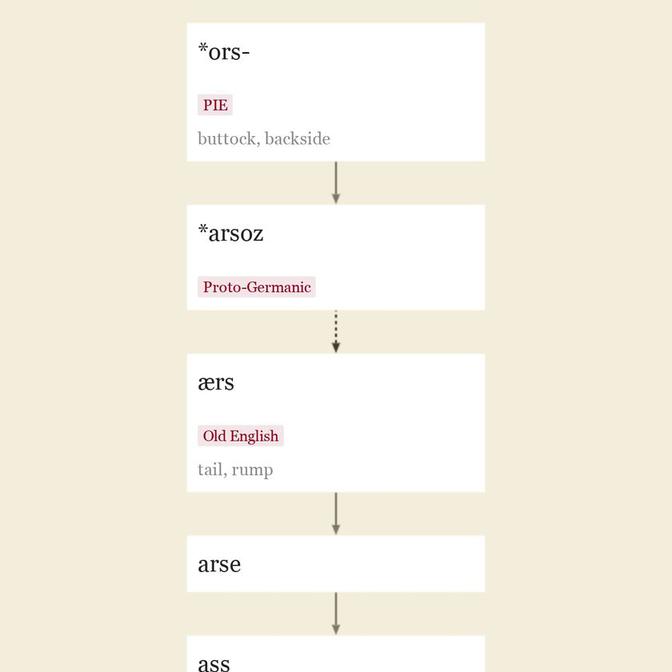dumb-ass (n.)
同样出自1959年, dumbass 也是一个“愚蠢、无效”的人。它的词源来自于 dumb(形容词)的“愚蠢”和 ass(名词)。
dumb-ass 的相关词汇

“后面”,1860年在航海俚语中被证实,从1930年开始流行,主要在美国,来自方言变体发音 arse(参见)。在 -s- 之前失去 -r- 并不罕见(burst/bust, curse/cuss, horse/hoss, barse/bass, garsh/gash, parcel/passel)。
从17世纪开始,可以追溯到从 arse 到 ass 的变化的间接证据。到1680年代, arse 的发音已经与“-ass”单词押韵,如在“Sodom or the Quintessence of Debauchery”中:“I would advise you, sir, to make a pass/Once more at Pockenello's loyal arse.”如果尼克· Bottom 在“仲夏夜之梦”(1594)中变成驴子是一些人认为的文字游戏,那么这可能早在莎士比亚时代就出现了。
I must to the barber's, mounsieur; for me thinks I am marvellous hairy about the face; and I am such a tender ass, if my hair do but tickle me, I must scratch. [Bottom]
我必须去理发店,先生; 因为我觉得我的脸上有很多毛发; 而且我是这样一个娇嫩的驴,如果我的头发只是轻轻地挠我,我就必须挠一下。[Bottom]
到1785年,有礼貌的说话者避免使用“驴”的意思。
“将女人视为性对象”的含义早在1940年代初就已经出现(似乎在1930年代的提华纳圣经中暗示了 piece of ass),但这个形象更早(比较 buttock “一个普通的妓女”,1670年代)。到1969年,“have (one's) head up (one's) ass”“不知道自己在做什么”已经被证实。俚语 (one's) ass “自己,自己的人”在1958年被证实。到1946年,“work (one's) ass off”“非常努力地工作”; 到1972年,“laugh (one's) ass off”“非常大声地笑”(从1965年暗示)。( stick it) up your ass 誓言在1953年被证实; 明显的委婉语表明早期的使用:
He snoighed up his nose as if th' cheese stunk, eyed me wi an air o contempt fro my shoon to my yed, un deawn ogen fro my yed to my shoon ; un then pushin th' brade un cheese into my hont ogen, he says "Take your vile bread and cheese and stick it up your coat sleeve, and be demmed to you. Do you think I want your paltry grub?" Un then, turnin on his heel, he hurried into th' perk. ["Bobby Shuttle un His Woife Sayroh's Visit to Manchester," 1857]
他嗤之以鼻,好像奶酪发臭,从我的鞋到我的头,用轻蔑的眼神看着我,然后从我的头到我的鞋,再次把面包和奶酪推到我的手中,他说:“把你那肮脏的面包和奶酪塞进你的衣袖里,去见鬼吧。你以为我想要你那微不足道的食物吗?”然后,他转身走进了公园。[“Bobby Shuttle un His Woife Sayroh's Visit to Manchester”,1857]
古英语中的“dumb,”指的是人,“沉默的,无言的,不说话的或无法说话的”,源自原始日耳曼语中的“*dumbaz”,意为“哑的,愚钝的”,可能源自 PIE 中的“*dheubh-”,意为“混乱,昏迷,头晕”,源自词根“*dheu-”(1),“尘土,雾气,蒸汽,烟雾”,也表达了与“感知或智力缺陷”相关的概念。自13世纪以来,“-b”可能一直保持沉默。相关词汇: Dumbly; dumber; dumbest。对于动物来说,“缺乏言语”,因此“没有智力”(约1200年)。
这种意义上的分歧可能是通过“因为无知或不理解而不回应”的概念而来的。古英语、古撒克逊语(dumb)、哥特语(dumbs)和古诺尔斯语(dumbr)中的词形只表示“哑的,无言的”; 在古高地德语(thumb)中,它既有这个意思,又有“愚蠢”的意思,在现代德语中,后者成为唯一的意思(“哑的,无言的”这个意思则用 stumm 表示)。在中古英语中,“愚蠢,无知”的意思偶尔出现,但这个意义上的现代用法(自1823年以来)似乎是受到德语 dumm 的影响,尤其是在宾夕法尼亚德语中。
dumb-cake ..., n. A cake made in silence on St Mark's Eve, with numerous ceremonies, by maids, to discover their future husbands. [Century Dictionary]
哑糕...,名词。在圣马克前夜,由女仆们在沉默中制作的蛋糕,伴有许多仪式,用来发现她们未来的丈夫。[世纪词典]
用于指代无声的设计,因此 dumb-waiter。Dumb ox “愚蠢的人”可追溯至1756年; dumb-bunny “愚蠢的人”是1922年大学俚语; dumb blonde “被视为无法理解复杂事物的女人”可追溯至1936年。